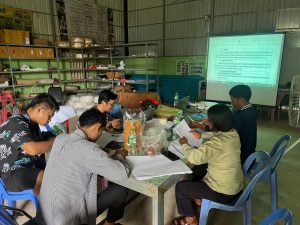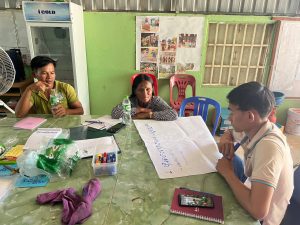Battambong province | June 22 to 26, 2023
In partnership with Chamroeun Microfinance PLC, CamboDHRRA provided 5 day-training to Ponlur Thmey Pech Chenda agricultural cooperative at Phnom Proek district and Battambang province to develop Operational Manual including Administrative and Financial Policies with participation of five board of directors and internal control committees.
It’s importance to note that an operational manual, including administrative and financial policies, is crucial for the effective functioning of an agricultural cooperative. Here are some key reasons why it is important:
Clarity and Consistency: An operational manual provides clarity and consistency in the agricultural cooperative’s administrative and financial processes. It outlines the procedures, rules, and guidelines that govern the day-to-day operations, ensuring that all members and staff have a clear understanding of their roles and responsibilities.
Governance and Decision-making: The manual establishes a framework for governance and decision-making within the cooperative. It defines the structure, roles, and responsibilities of the board of directors, committees, and management team, ensuring transparency, accountability, and effective decision-making processes.
Financial Management: The manual includes financial policies and procedures that guide the agricultural cooperative’s financial management. It outlines processes for budgeting, accounting, internal controls, financial reporting, and auditing. This helps ensure the proper management of financial resources, transparency, and accountability in financial transactions.
Risk Management: An operational manual addresses risk management within the agricultural cooperative. It includes policies and procedures for identifying, assessing, and mitigating risks related to operations, finance, legal compliance, and other areas. This helps protect an agricultural cooperative from potential risks and ensures the sustainability of its operations.
Compliance and Legal Requirements: The manual ensures compliance with legal and regulatory requirements. It includes policies and procedures that align with relevant laws, regulations, and industry standards. This helps the agricultural cooperative operate within the legal framework, maintain good standing, and avoid potential legal issues or penalties.
Training and Capacity Building: An operational manual serves as a training and capacity-building tool. It provides a reference guide for new members, staff, and volunteers, helping them understand an agricultural cooperative’s operations, policies, and procedures. It facilitates consistent training and knowledge transfer, ensuring that everyone is equipped to perform their roles effectively.
Succession Planning: The manual supports succession planning within an agricultural cooperative. It documents key processes, knowledge, and procedures, ensuring continuity even when there are changes in leadership or staff. This helps maintain stability and efficiency in the cooperative’s operations over the long term.
Overall, an operational manual, including administrative and financial policies, provides a framework for effective governance, financial management, risk mitigation, compliance, and capacity building within an agricultural cooperative. It promotes transparency, accountability, and sustainability, contributing to the cooperative’s success and the well-being of its members.

 Cambodhrra Cambodian Partnership for Development Human Resource in Rural Area Association
Cambodhrra Cambodian Partnership for Development Human Resource in Rural Area Association






